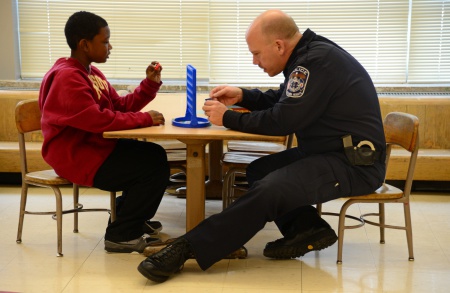
Raising a black son, Gail Howard couldn’t shake the fear that someday, he was going to get shot. She even saw a therapist, who told her the odds were higher that she’d win the lottery. Jordan, an A student and an athlete, wanted her to relax, too — he told her she treated him like a baby. The 17-year-old spent the entire day of Jan. 5, 2011, begging his mother for permission to walk alone to meet up with friends. Eventually, she grudgingly gave in.
“I said, ‘We’ll see how safe this town is once your eyes are looking down the barrel of a gun,'” Howard, who lives in Redlands, California, told The Huffington Post. “Those were the last words I spoke to him, and then 15 minutes later I get a phone call, he’s shot in the eye.”
Jordan and one of his friends were lucky enough to survive the gang shooting that took place that day; two other boys who were with them at the playground were not. Over the course of the yearlong investigation that followed, Howard — who had previously had few interactions with police — began to see local police officers as partners rather than patrolmen, forging bonds that would last far beyond the investigation and inspire her to begin fighting for the city’s kids.
“They did not stop until they figured out who shot my boy and his friends,” Howard said of the Redlands police, who eventually caught the shooters; they were convicted and sentenced to life behind bars. “I’m forever grateful to them.”
Howard’s attitude may come as a surprise at a time when relations between many police departments and their communities appear strained. The public remains outraged over the deaths of Michael Brown and Eric Garner and the subsequent failure to indict the police officers who killed them. In fact, there seems to be one thing nearly everyone agrees on after the months of protests those killings inspired: The relationships between American police and the communities they protect, particularly minority communities, are in need of serious repair.
“The system of policing has earned our mistrust,” said Opal Tometi, a New York-based activist and co-founder of the #BlackLivesMatter campaign. In many ways, Tometi’s group embodies the recent decline in relations between police and communities.
#BlackLivesMatter protests across the country have called for reformsincluding increased accountability surrounding police shootings and a reduction in the use of military equipment by local police departments. The shooting of two New York City police officers shortly after the announcement of the Garner verdict further intensified the national debate on policing in America.
But beyond the headlines, many police forces are working to build trust with their communities. Police experts say that improved relations can be attributed largely to common-sense approaches that build on the philosophy known as community policing.
Go here for more.



